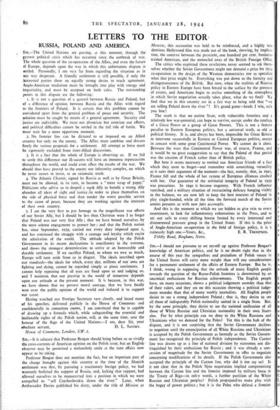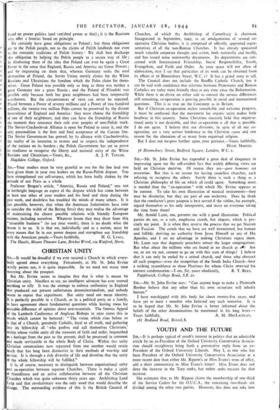SIR,—I should not presume to set myself up against Professor
Brogan's knowledge of American politics, and he is no- doubt right that in the course of this year the sympathies and prejudices of Polish voters in the United States will carry more weight than will any considerations for a permanent settlement of the affairs of Eastern Europe. But he is, I think, wrong in supposing that the attitude of many English people.. towards the question of the Russo-Polish frontiers is- determined by an uncritical enthusiasm for Russian achievements. The English people have, on many occasions, shown a political judgement sounder than that of their rulers, and they are on this occasion showing a political judge- ment sounder than that of many weekly journalists. All English people desire to see a strong independent Poland ; that is, they desire to see all those of indisputably Polish nationality united in a single State. But, by the same principle, they desire to see the national unification of all those of White Russian and Ukrainian nationality in their own States also. For by what principle can we deny to the White Russians and. Ukrainians what we demand for the Poles? Yet this is the hub of the dispute, and it is not surprising that the Soviet Government declines to negotiate until the emancipation of all White Russians and Ukrainians is accepted by the Polish Government as formally as the Soviet Govern- ment has recognised the principle of Polish independence. The Curzon line was drawn up as a line of national division by statesmen not dis- tinguished by their enthusiasm for Russia ; and it was already a con- cession of magnitude for the Soviet Government to offer to negotiate concerning modifications of its details. If the Polish Government also accepted the principle of the Curzon line, why did it not say so? Is it not dear that in the Polish Note negotiation implied compromising between the Curzon line and the frontier imposed by military force in the Treaty of Riga—in other words, a further partition of the White Russian and Ukrainian peoples? Polish propagandists make play with the bogey of power politics ; but it is the Poles who defend a frontier
based on power politics (and vanished power at that); it is the Russians who offer a frontier based on principle.
We certainly have great obligations to Poland ; but these obligations are to the Polish people, not to the claims of Polish landlords nor even to the romantic traditions of Polish history.- We shall best discharge this obligation by helping the Polish people to a secure way of life ; by disabusing them of the idea that Poland can ever be again a Great Power in the sense that England, Russia and America are Great Powers ; and by impressing on them that, whereas Germany seeks the total destruction of Poland, the Soviet Union merely claims for the White Russians and Ukrainians the freedom which the Poles claim for them- selves. Great Poland was possible only so long as there was neither a great Germany nor a great Russia ; and the Poland of Pilsudski was possible only because both her great neighbours had been temporarily overthrown. But the circumstances of 1919 can never be repeated. Placed between a Power of seventy millions and a Power of two hundred millions, the twenty-two million Poles cannot be preserved by the distant benevolence of England and America: they must choose the friendship of one of their neighbours, and they can have the friendship of Russia the moment they renounce their rule over peoples of non-Polish stock. The Soviet-Czechoslovak Alliance is open for Poland to enter it, and the only precondition is the firm and final acceptance of the Curzon line. The Soviet Government has proved, by its alliance with Czechoslovakia, the reality of its intention to restore and to respects the independence of the nations on its borders ; the Polish Government has yet to prove its readiness to recognise the liberty and national unity of the White



























 Previous page
Previous page